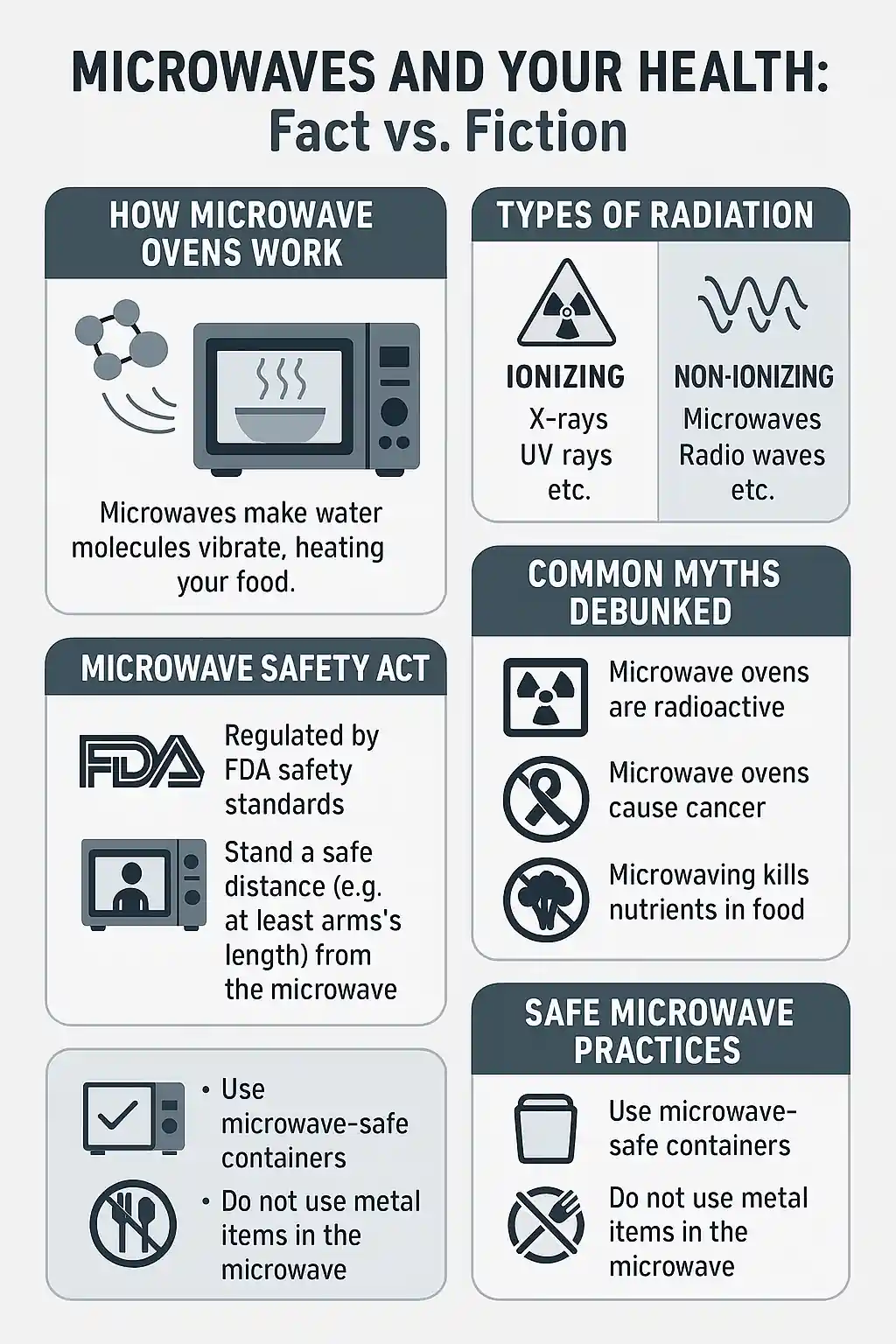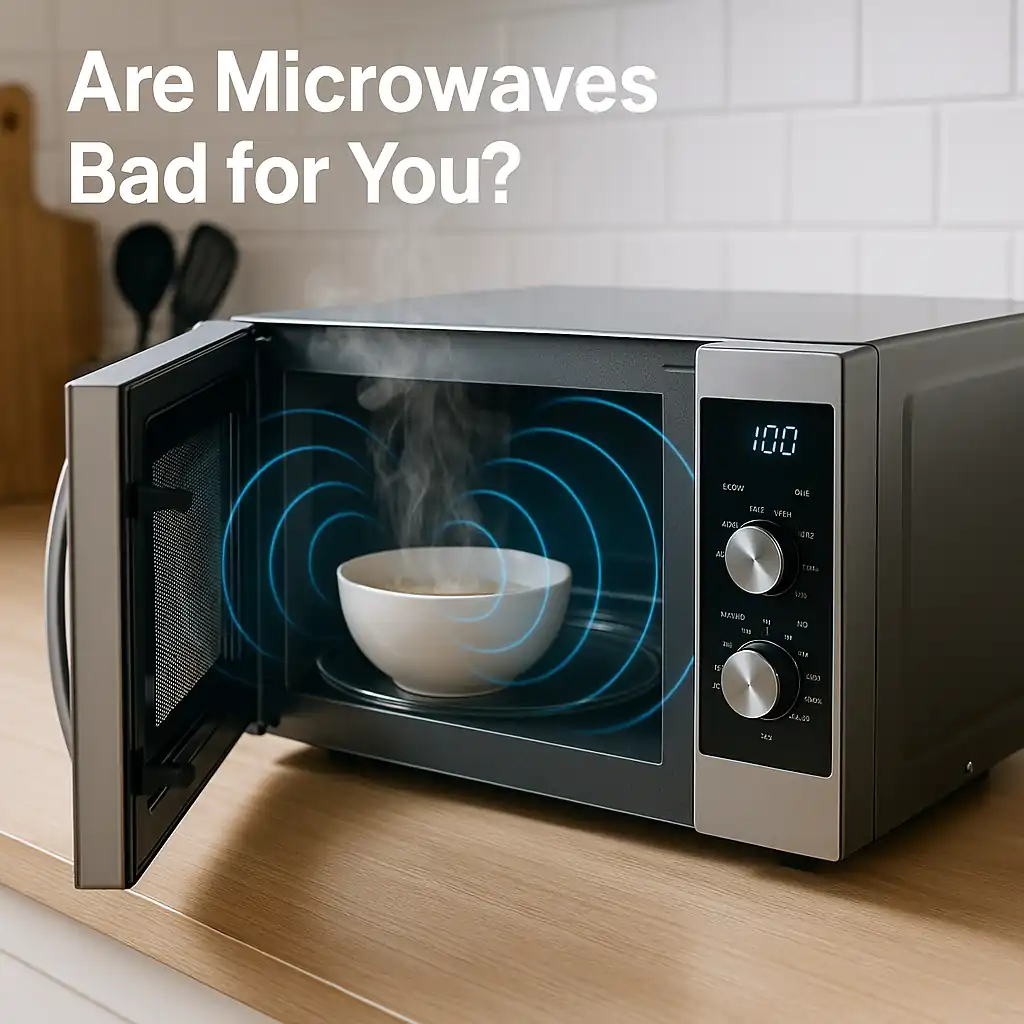Are Microwaves Bad for You? A Complete Guide to Microwave Ovens and Your Health
Introduction
Microwave ovens have become a staple in modern kitchens. Whether you’re reheating leftovers, popping popcorn, or preparing a quick meal, the microwave offers unmatched convenience. But for decades, questions have lingered: Are microwaves bad for you? Is microwave radiation harmful? Can microwave ovens cause cancer, or do they make your food radioactive?
This article offers a well-researched, comprehensive exploration of microwave ovens and your health. We’ll examine how microwaves work, what kind of radiation they use, their potential risks, and how to use them safely.
What Is a Microwave and How Does It Work?
A microwave oven uses microwave radiation to heat food. These microwaves are a form of non-ionizing electromagnetic radiation, meaning they don’t carry enough energy to ionize atoms or molecules or damage DNA directly.
The core concept behind microwave cooking is the vibration of water molecules in food. When exposed to microwave energy, the water molecules in the food start vibrating rapidly, generating heat that cooks the food from the inside out. This process is different from traditional ovens, which rely on conduction and convection to heat your food.
Microwaves are produced inside the appliance by a component called a magnetron. These microwaves are reflected inside the oven’s metal walls and absorbed by the food inside, focusing the energy on what you’re heating. The microwave energy is changed into thermal energy as it’s absorbed.
Understanding Microwave Radiation
What Kind of Radiation Do Microwaves Use?
The type of radiation used in microwave ovens is non-ionizing radiation—a lower-energy form of electromagnetic radiation. Unlike ionizing radiation (used in X-rays or nuclear reactors), it doesn’t have enough energy to alter DNA or make food radioactive.
Microwave radiation falls between radio waves and infrared radiation in the electromagnetic spectrum. Because of its frequency (typically 2.45 GHz), it is particularly effective at causing molecules in food to vibrate, especially water molecules, which then generate heat.
Are Microwaves a Source of Harmful Radiation?
Concerns around microwave radiation harmful effects have persisted for years. However, microwaves use non-ionizing radiation, which is not the kind that causes direct cellular damage or genetic mutations. While radiation from microwaves can heat body tissue at extremely high levels, consumer microwave ovens are specifically designed to prevent exposure to such intensities.
The Food and Drug Administration (FDA) and its Center for Devices and Radiological Health (CDRH) regulated the manufacture of microwave ovens to ensure safety. According to FDA tests on microwave ovens, the levels of microwaves that might leak through a microwave door are well below the threshold known to cause harm.
Can Microwaves Cause Cancer?
The Short Answer
There is no credible scientific evidence that the radiation used by microwaves causes cancer. Here’s why:
-
Microwave ovens are designed to keep radiation inside the unit.
-
The form of electromagnetic radiation they emit is non-ionizing, which does not damage DNA.
-
The FDA and other international health organizations have not found any link between microwaves and cancer.
Misconceptions Around Radiation
The word radiation often raises alarms. But remember, there are different types of radiation, and not all are harmful. Ionizing radiation (like gamma rays and UV rays) can indeed damage tissues and DNA. In contrast, the microwave radiation used in your kitchen is safe when proper guidelines are followed.
Even though microwave radiation can heat body tissue, this only becomes a concern in rare cases of damaged microwave ovens or deliberate exposure to industrial-strength microwaves.
Do Microwaves Make Food Radioactive?
A pervasive myth is that microwave food is somehow radioactive after heating. This is categorically false.
Microwave ovens heat food by causing the water molecules in food to vibrate, producing heat through friction. There is no nuclear or radioactive process involved. The radiation used is not absorbed into the food in a way that would alter its chemical composition or introduce radioactivity.
The claim that cooking with microwaves will make food radioactive has no basis in science.
Are There Health Effects from Using Microwaves?
Short-Term Effects
There is little to no evidence of health effects from using your microwave under normal conditions. As long as the microwave oven is functioning properly, closed securely, and not damaged, the chances of radiation leakage are minimal.
Long-Term Exposure Concerns
Long-term studies on household microwave ovens have not shown any significant correlation with adverse health outcomes. Nonetheless, certain groups raise concerns:
-
People with implanted medical devices, such as pacemakers, should ensure their devices are shielded against electromagnetic interference.
-
Microwaves can cause cataracts in animals exposed to very high, sustained radiation levels, but this is not applicable to household use.
Cooking in Plastic Containers: Is It Safe?
One of the most common concerns about microwave ovens is whether it’s safe to heat your food in a plastic container.
Risks of Microwave Plastic
Certain plastics can melt or leach chemicals when exposed to microwave radiation. These chemicals, such as Bisphenol A (BPA), may mimic hormones in the body and have been associated with health risks in animal studies.
Microwave Safe Labels
To minimize risk:
-
Only use containers labeled microwave safe.
-
Avoid microwaving plastic wrap, takeout containers, or plastic containers not explicitly made for microwave use.
-
Consider glass or ceramic containers as a safer alternative.
Nutrient Retention in Microwave Cooking
Is Microwave Cooking Bad for Nutrients?
Contrary to the belief that microwave cooking destroys nutrients, several studies show it can actually preserve nutrients better than some other cooking methods.
For example:
-
Boiling vegetables causes water-soluble nutrients like vitamin C to leach into the water.
-
Steaming or microwaving your food with minimal water helps retain more nutrients.
The key is to avoid overcooking and use minimal liquid.
How to Use a Microwave Oven Safely
General Safety Tips
-
Inspect regularly: Check the microwave door seal and hinges for damage.
-
Avoid metal: Never put aluminum foil or utensils in the microwave.
-
Use microwave-safe containers: Only use containers tested for high-heat endurance.
-
Avoid overheating water: Superheating can cause water to erupt unexpectedly.
-
Allow steam to escape: When covering food, leave a corner open for venting.
Cooking Tips for Better Results
-
Stir microwave food halfway to ensure even heating.
-
Use lower power settings for defrosting.
-
Let food rest after cooking to allow heat distribution.
What the FDA Says About Microwave Safety
The Food and Drug Administration has extensive consumer information on microwave ovens, including:
-
Guidelines on safe microwave operation.
-
Limits on microwave radiation per square centimeter.
-
Ongoing tests on microwave ovens to ensure safety across manufacturers.
The FDA confirms that microwave ovens are safe when used according to manufacturer instructions.
Real-World Applications and Everyday Use
Popcorn and Convenience Meals
Microwaves revolutionized convenience cooking with popcorn, ready meals, and fast reheating. Most modern households use microwaves every day.
Microwaves in Medical and Industrial Fields
Microwave technology is also used in:
-
Medical treatments (e.g., diathermy).
-
Industrial heating processes.
-
Telecommunications (though at different frequencies).
This demonstrates the versatility and relative safety of microwave energy.
Microwave Myths vs. Facts
| Myth | Fact |
|---|---|
| Microwaves make food radioactive | Microwaves do not and cannot make food radioactive |
| Microwave ovens cause cancer | No scientific evidence supports this claim |
| Microwaves destroy nutrients | Minimal nutrient loss, often less than boiling |
| All plastics are microwave-safe | Only those labeled microwave-safe are |
| You shouldn’t stand near a microwave | Standing nearby is safe if the unit is functioning properly |
Want to understand the science behind everyday kitchen tech? Learn the basics in our full guide on how microwaves work.
Microwaves and Your Health: Myths, Facts, and Safe Usage Tips

Frequently Asked Questions (FAQ)
Can microwaves cause cancer?
No. Microwaves use non-ionizing radiation, which doesn’t damage DNA. There is no verified link between microwave ovens and cancer.
Is it safe to eat food cooked in a microwave?
Yes. Food cooked in a microwave is safe to eat, provided it is cooked evenly and the container used is microwave safe.
Are there any dangers from microwave radiation?
Only under unusual conditions—like a damaged microwave or bypassing safety interlocks—would you be exposed to levels of microwave radiation that could cause harm.
Do microwaves kill bacteria?
Yes, if the food reaches a high enough internal temperature. Like other cooking methods, microwaves use heat to kill pathogens, but uneven heating can be an issue.
Can I use any plastic container in the microwave?
No. Only use plastic containers labeled microwave safe. Others may melt or release harmful chemicals into your food.
Is standing in front of a microwave dangerous?
Not under normal conditions. Microwave ovens are designed with shielding and safety features. Radiation leakage is negligible.
What foods should I avoid microwaving?
Avoid eggs in their shells, hot peppers, and sealed containers. These can explode or release fumes when heated.
Can microwaves interfere with medical devices?
Rarely. Modern pacemakers are well shielded. If you have a medical implant, consult your doctor about electromagnetic sensitivity.
Conclusion
So, are microwaves bad for you? Based on scientific evidence and regulatory guidelines, the answer is no—microwave ovens are safe when used correctly. The radiation from microwaves is non-ionizing, meaning it won’t cause cancer or make your food radioactive. Concerns about nutrient loss and plastic leaching can be managed with informed practices.
Understanding how microwaves work, using the right containers, and maintaining your appliance properly ensures that this essential kitchen tool remains a safe and valuable part of your daily routine.

